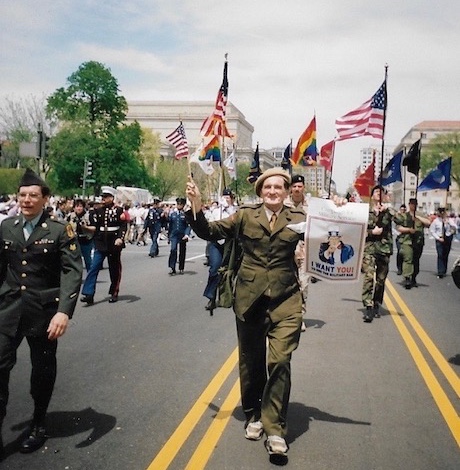Obituary
Senator John McCain Remembered
A Maverick Redeemed
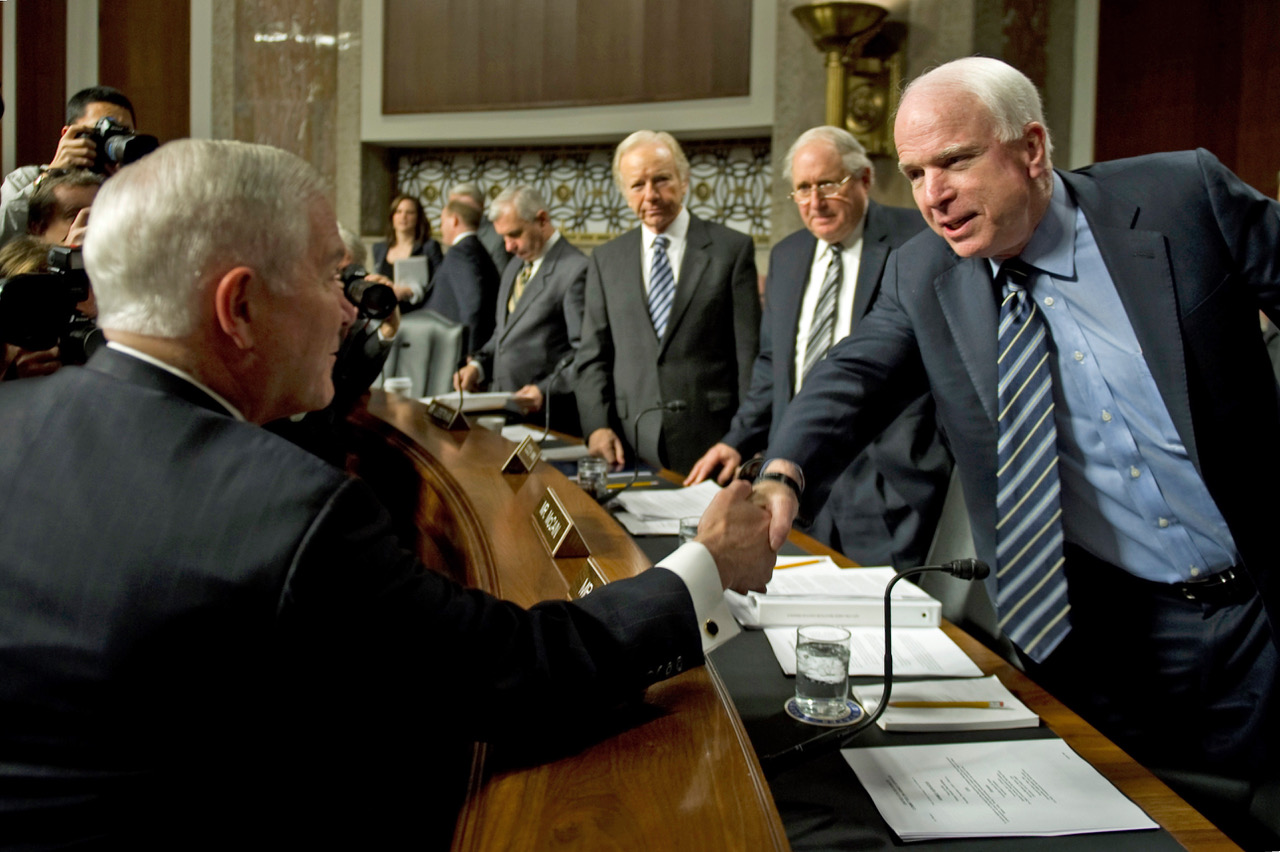

(Editor’s note: Sen. John McCain, a lion of the US Senate and a Vietnam War hero, died of cancer late Saturday afternoon at his home in Arizona, surrounded by family. He was 81. As tributes pour in, perhaps none is more moving than that by his daughter Meghan McCain, an LGBT ally. In this important historic remembrance, out former Marine Captain and longtime Servicemembers Legal Defense board co-chair Tom Carpenter contextualizes McCain’s legacy in terms of LGBT military service. – Karen Ocamb)
The giant brass entry doors of the United States Naval Academy Chapel are emblazoned with what many consider the motto of the United States Navy — “Non Sibi Sed Patriae” – Not for self but for country. In many ways, John McCain’s life epitomized this ideal.
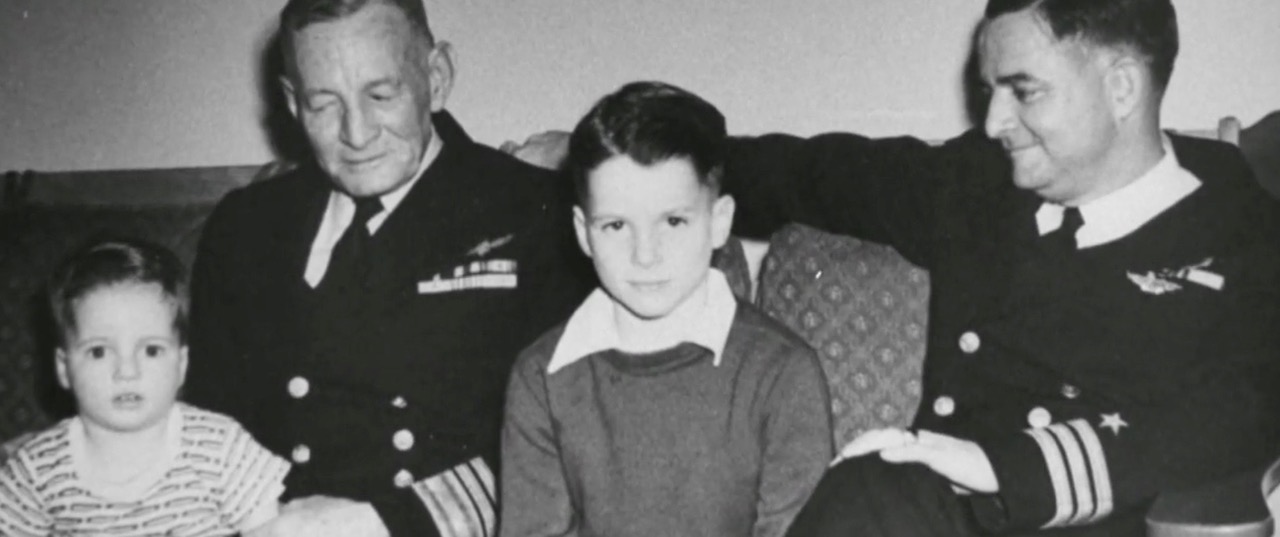
Young John S. McCain III, center, with his grandfather Vice Adm. John S. McCain Sr., left, and father, right, Cmdr. John S. McCain Jr. in a family photo from the 1940s (Photo from CBS Morning News).
McCain and I share much in common. Both of us come from families who served in the military for generations. McCain’s grandfather, 4 Star Admiral John Sidney McCain, commanded a carrier task force in the Pacific during World War II. His father, 4 Star Admiral John “Junior” McCain, was the commencement speaker at my graduation from the Naval Academy in 1970. At that time, McCain was a POW in Hanoi.
In 1967, McCain, a Naval Academy graduate and Naval Aviator, survived the tragic fire onboard the USS Forrestal. Shortly thereafter, he was shot down while flying a bombing mission over Hanoi. During his ejection from his A-4 Skyhawk, the same aircraft I flew when I was in the Marines, he broke his knee and both arms.
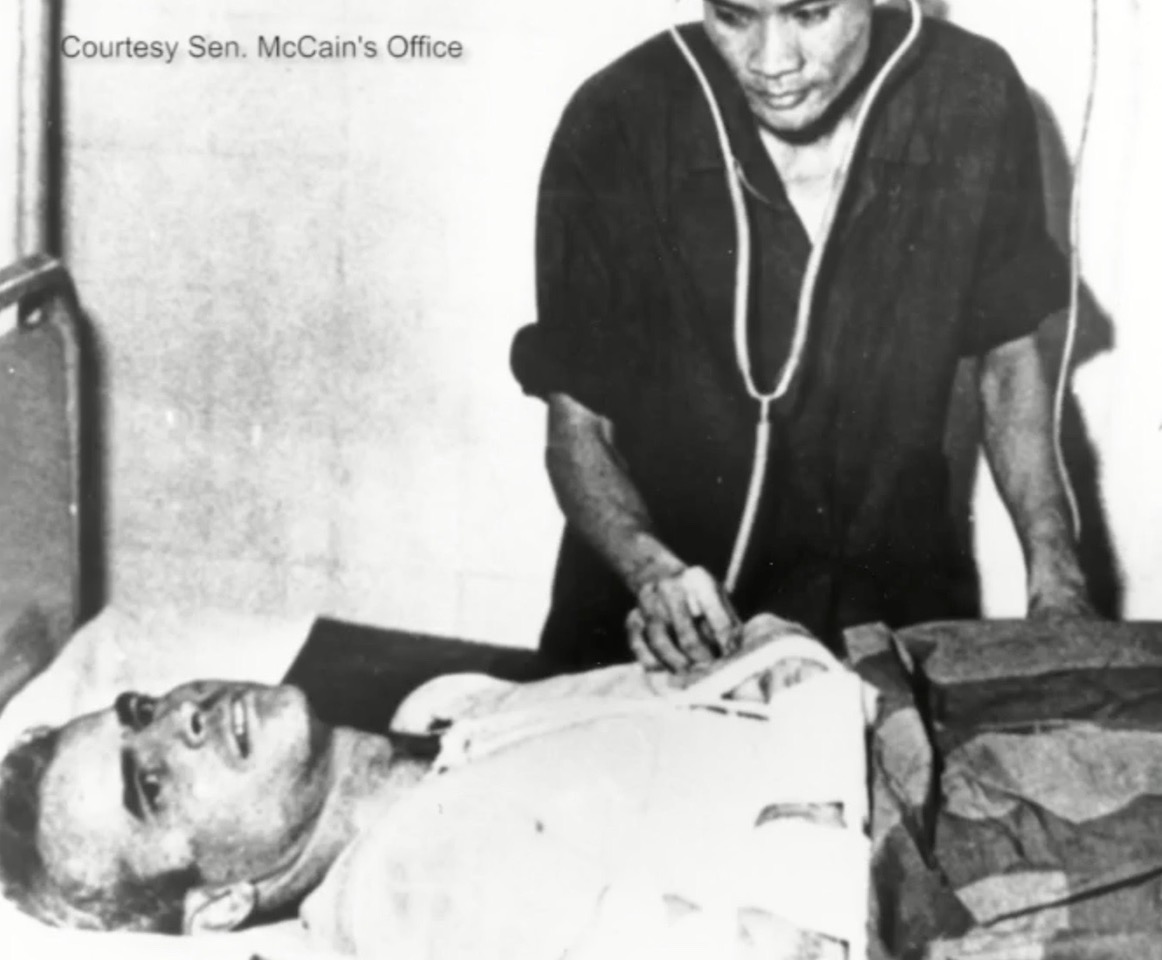
While in captivity, McCain was bayoneted in the ankle and the groin and had his shoulder smashed by a rifle butt. His injuries were so serious, the North Vietnamese were just going to let him die. Then they found out he was the son of an Admiral—not just any Admiral—but the Commander of the Pacific Fleet. In order to keep McCain alive, to use for propaganda and as a pawn, the North Vietnamese treated his injuries. When his captors offered him an early release, ahead of those who had been POW’s longer, McCain refused. They were so outraged; the North Vietnamese tortured him for months.
In 1973, McCain was repatriated. The injuries he sustained during ejection, while being captured and during his many sessions of brutal interrogation and torture almost prevented him from returning to flying. He fought his way back to become the commanding officer of the largest squadron in the Navy.
Before retiring as a Captain in 1981, McCain was the Navy’s top Senate liaison. It was during his final tour of duty that he caught the political bug.
Senator McCain became known as “The Maverick.” Though solidly conservative on most issues, from time to time he would oppose the positions staked out by his fellow Republicans. Not the case on most LGBT issues.
From 1995 through 2012, I was a board member and co-chair of the Servicemembers Legal Defense Network (SLDN), an organization dedicated to the repeal of the un-American law known as “Don’t Ask, Don’t Tell”(DADT). I became very familiar with Senator McCain’s views on the issue of gays in the military. He was one of the strongest and most outspoken opponents of open and honest service. A position supported by his Republican party.
In 1993, when newly elected President Bill Clinton attempted to fulfill his promise to lift the ban on gays and lesbians serving openly in the U.S. armed forces, McCain was one of the leaders of the assault on the President’s efforts. McCain’s proposed compromise was merely to end asking recruits if they were homosexuals, or had ever participated in homosexual activities, but to continue to exclude “the openly gay.”During the Senate hearings on the proposed DADT, he demonstrated his ignorance of the gay community and the issue. In a question to General Colin Powell, Chairman of the Joint Chiefs of Staff, McCain equated transvestites to gay men. Perhaps he had seen one too many episodes of “Mash” with Corporal Klinger prancing around in drag.
In 2000, during the Republican Presidential debate, McCain maintained that DADT was working. Saying: “I rely on people like General Colin Powell, people I served with all my adult life, who tell me that this policy is working.”
During the 2007 Republican Presidential debate, when asked about repealing DADT, McCain stated: “I think it would be a terrific mistake to even reopen the issue. It is working, my friends.” By then, thousands had been discharged from the service under the law while the majority of the public supported open service of LGBT Americans.
Every year during SLDN’s annual Lobby Days, we attempted to meet personally with McCain to discuss the issue, and every year he refused. Was it because he did not want to meet LGB service members who were serving and who he might identify with? His mind was obviously made up and it appeared clear nothing was going to change it. There were many Naval Academy graduates leading the fight to repeal DADT. All of us shared a profound disappointment in McCain’s intransigence and outright opposition.
Another Annapolis graduate, Admiral Mike Mullen, Chairman of the Joint Chiefs of Staff, made a moving and impactful statement during the 2010 Senate hearings on the repeal of DADT. “We have in place a policy that forces young men and women to lie about who they are in order to defend their fellow citizens,” Mullen said. “For me, personally, it comes down to integrity: Theirs as an individual, ours as an institution.”
Reacting to Admiral Mullen’s support of repeal, McCain’s communications director said: “One person, speaking individually, not on behalf of the Navy at all, is not going to change Senator McCain’s position” on the issue,
McCain was upset the military survey the Pentagon had commissioned did not ask explicitly whether troops were in favor or against repealing DADT. Mullen rightly argued that asking troops for their opinions on the repeal would be akin to a referendum on the policy, something he called a “bad precedent.”

Hearing regarding “Don’t Ask, Don’t Tell,” U.S. Secretary of Defense Robert M. Gates greets Ranking member, John McCain. December 2, 2010. (Photo by Petty Officer 1st Class Chad J. McNeeley, U.S. Navy, Defense Dept)
Finally, in December of 2010, in the lame duck session of the Congress, McCain made his last stand in opposition to the repeal of DADT. In a bitter speech, he told the Senate he had talked to thousands of active duty service members and most were against repeal. He predicted dong away with DADT would lead to a breakdown of unit cohesion and damage our military readiness. When the legislation finally passed he said, “Today is a very sad day.”
McCain’s predictions about how damaging the repeal of DADT would be to the military proved to be completely wrong. The implementation of the change in the law by the military was flawless. Today, LGB service members are serving around the world with pride. Their marriages are recognized, and for the most part, they and their families are fully integrated into the services.
Finally, in 2016 the Obama Administration lifted the long time ban on transgender service. Unlike 1993, when all the senior military leaders opposed open service of LGB Americans, the current leadership was completely on board with this change in policy. On July 26, 2017, before the policy could be fully implemented, newly elected President Donald Trump tweeted that he would not allow “transgender persons to serve in any capacity.” The Pentagon was blindsided. How would Senator McCain, Chairman of the Senate Armed Services Committee, respond?
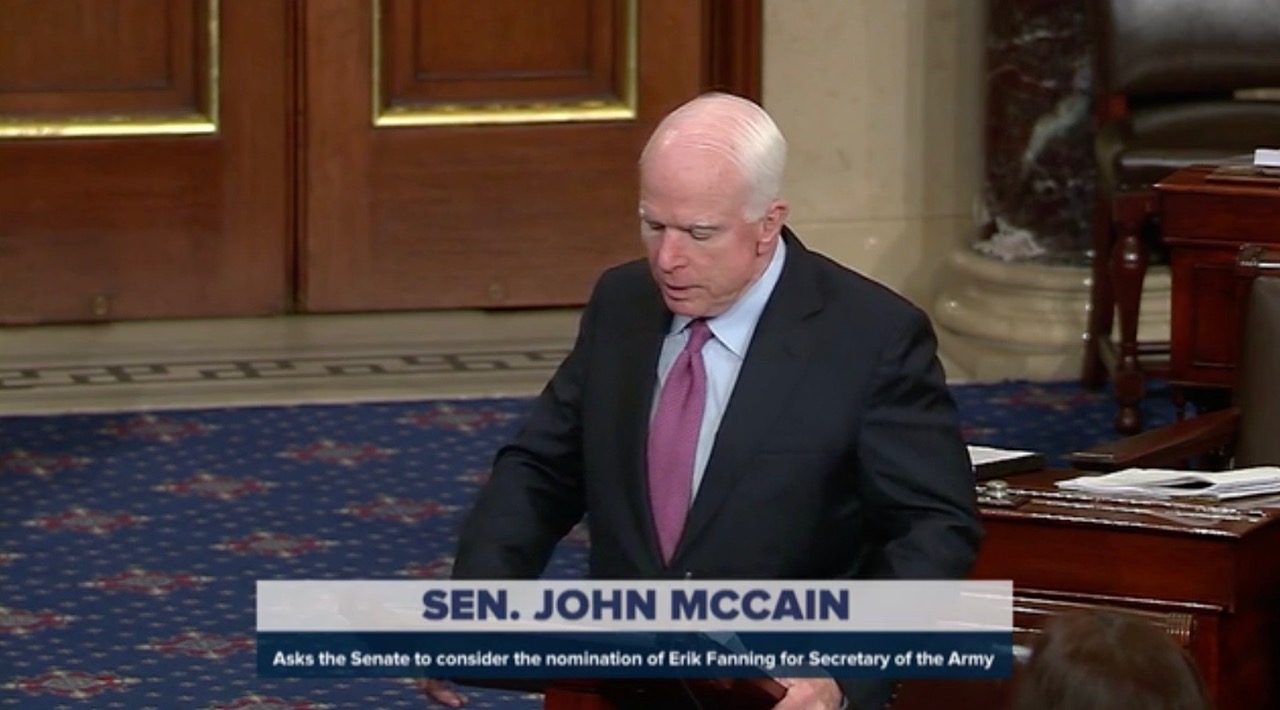
Perhaps he had already shown his hand. In April 2016, McCain came out in support of the first gay Secretary of the Army, Eric Fanning. After months of a hold on Fanning’s nomination by Senator Roberts of Kansas, McCain argued to his Senate colleagues: “Mr. Fanning is eminently qualified to assume that role of Secretary of the Army. So I would urge my friend and colleague to allow me… to not object to the unanimous consent that I am just proposing.”
At the same time, McCain was one of few Republicans in favor of a proposed law that would stop discrimination based upon sexual orientation and gender identity. Back home in Arizona, he opposed a state law that would allow business to refuse to serve LGBT citizens based upon their sincerely held religious beliefs.
In September 2017, McCain co-sponsored a bill in support of transgender Americans serving in the military. In a statement he declared: “When less than one percent of Americans are volunteering to join the military, we should welcome all those who are willing and able to serve our country. Any member of the military who meets the medical and readiness standards should be allowed to serve — including those who are transgender.”
Why did John McCain change so much? Perhaps, diagnosed with a brain cancer, not usually survivable, McCain was facing his own mortality. Donald Trump, who never served a day in uniform and escaped the draft with a “bone spurs” medical exemption, insulted McCain during his run for President, saying: “He’s not a war hero. He’s a war hero because he was captured. I like people that weren’t captured.”
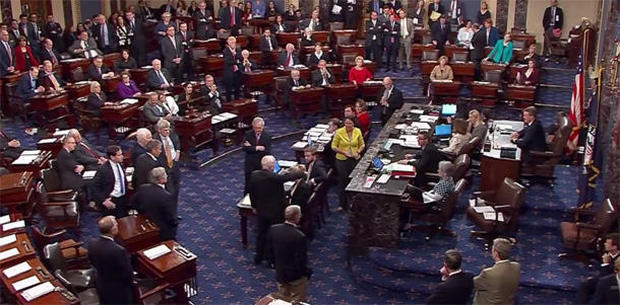
Sen McCain votes ‘No’ t repeal of Obamacare (screen grab via CSPAN)
McCain began to oppose Trump at ever turn. He dramatically cast the deciding vote to kill the bill that would repeal Obamacare. McCain favored the Dream Act and opposed “the wall,” the central promise of Trump’s campaign. Because of her admitted involvement in torture and refusal to call it immoral, he voted against Gina Haspel, Trump’s nomination for Director of the CIA. McCain became one of the few Republican members of Congress to speak out against an administration that was fatally flawed.
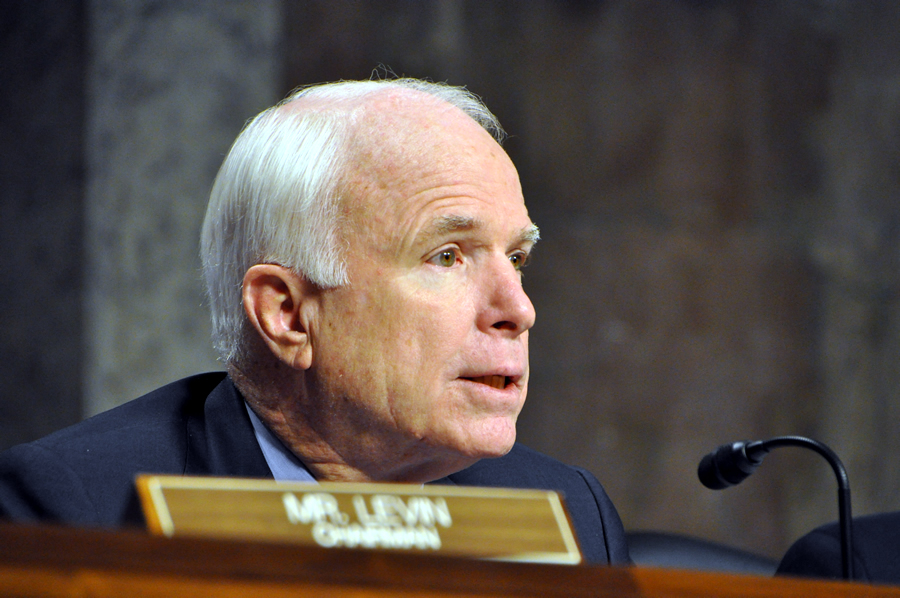
Sen. John McCain (photo by Michael Key for the Washington Blade)
Whatever motivated McCain is not important. What does matter is he finally saw the light. He followed his better angels. At the end of a long and distinguished life of public service, he recognized the important contribution of LGBT Americans to our country. Indeed, Senator McCain leaves us a Maverick redeemed.
Tom Carpenter, Attorney, Captain USMC (1979-1982), retired co- chair Servicemembers Legal Defense Network (1995-2012), co-chair Forum on the Military Chaplaincy.
Obituary
Nanette Kazaoka, an unlikely AIDS activist, dies at 83
Member of ACT-UP, longtime social justice advocate
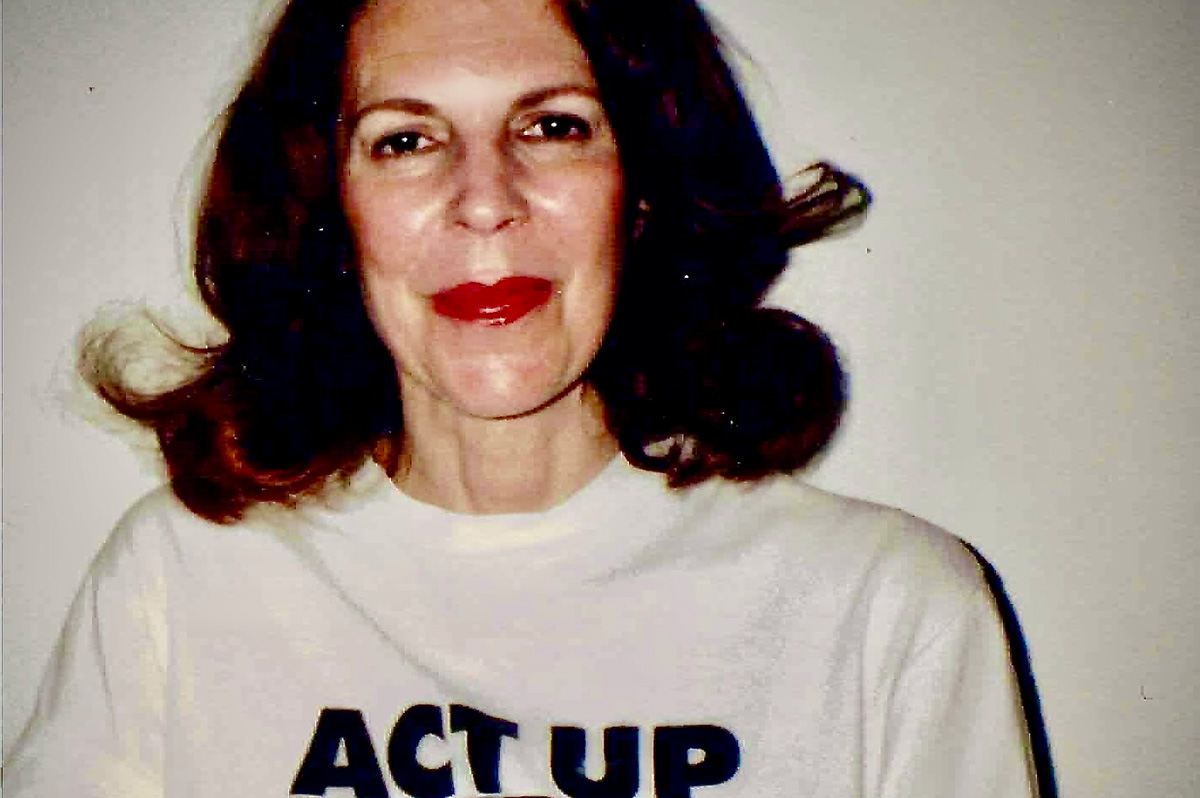
Nanette Kazaoka, a well-known figure in the fight for HIV/AIDS awareness and the rights of marginalized communities, passed away on Oct. 2 at her home in New York City. She was 83. The cause of death was complications from vascular dementia and Alzheimer’s disease, according to a statement from her daughter Kelly Kochendorfer.
Kazaoka was an advocate for justice, particularly in the early days of the AIDS crisis, when she became a member of the AIDS Coalition to Unleash Power, or ACT-Up. She is perhaps best remembered for her participation in a 2004 protest in front of Madison Square Garden during the Republican National Convention, when she and 11 fellow activists staged a dramatic naked demonstration, demanding debt cancellation for impoverished countries, according to a statement from the family.
“Bush, Stop AIDS. Drop the Debt Now!” they chanted, with slogans stenciled in black paint on their bodies. The bold protest drew national attention and underscored the urgency of global debt relief as a key element in the fight against AIDS.
She was born Nanette Natalina Bottinelli on June 12, 1941, in New York City. Her father, Angelo, worked as a waiter at the St. Regis Hotel, while her mother, Betty McComb, was a part-time burlesque dancer.
She married her first husband, Fred Kochendorfer, in 1963, and they had two children together, Kim Skrobe and Kelly, both of whom survive her.
Kazaoka’s journey to Fire Island marked a transformative period in her life. Kochendorfer wanted to live there, and so they began renting in 1967. Kazaoka then made a bold decision that would shape her future: She left her husband for another man and began living on Fire Island in 1968-1969, with the children attending school in Ocean Beach, according to the family’s statement.
This period coincided with the early days of the gay rights movement, as Fire Island was emerging as a hub for LGBTQ culture. Her experiences during these years contributed to the strong sense of activism and solidarity that would later define her role in ACT-UP and the broader fight for LGBTQ rights.
Kazaoka’s second husband, Katsushiga “Kats” Kazaoka, a Japanese-American psychologist who had been interred during World War II, died of cancer in 1984, pushing her to enter the workforce as a receptionist while studying occupational therapy at Downstate Medical Center. By 1990, she had earned her degree and sought work with AIDS patients.
In 1988, a close friend introduced her to ACT-UP, sparking the start of her full-time dedication to AIDS activism, the family said. Kazaoka became known for her passionate, unrelenting activism, whether protesting at City Hall or challenging anti-LGBTQ policies at St. Luke’s Hospital.
Kazaoka’s activism spanned 35 years, making her a beloved and respected figure within ACT-UP and beyond, the family noted. She was featured in Sarah Schulman’s “Let the Record Show: A Political History of ACT-Up New York, 1987-1993” as well as “Act-Up Oral History, No. 162,” a digital history. She was the cover photo of “Fag Hags, Divas and Moms: The Legacy of Straight Women in the AIDS Community,” and was included in The New York Times T Living Magazine story, “LEGENDS PIONEERS AND SURVIVORS.
Her dedication to science continued even after her passing: She donated her brain to the Mount Sinai NIH Brain and Tissue Repository for research to advance the understanding of the human brain health and disease to help end dementia, the family said.
Along with her daughters, Kazaoka is survived by her son-in-law John Skrobe, granddaughter Stella Skrobe and daughter-in-law Christine Arax, all of New York. She and her third husband, Paul Haskell, divorced in 2000.
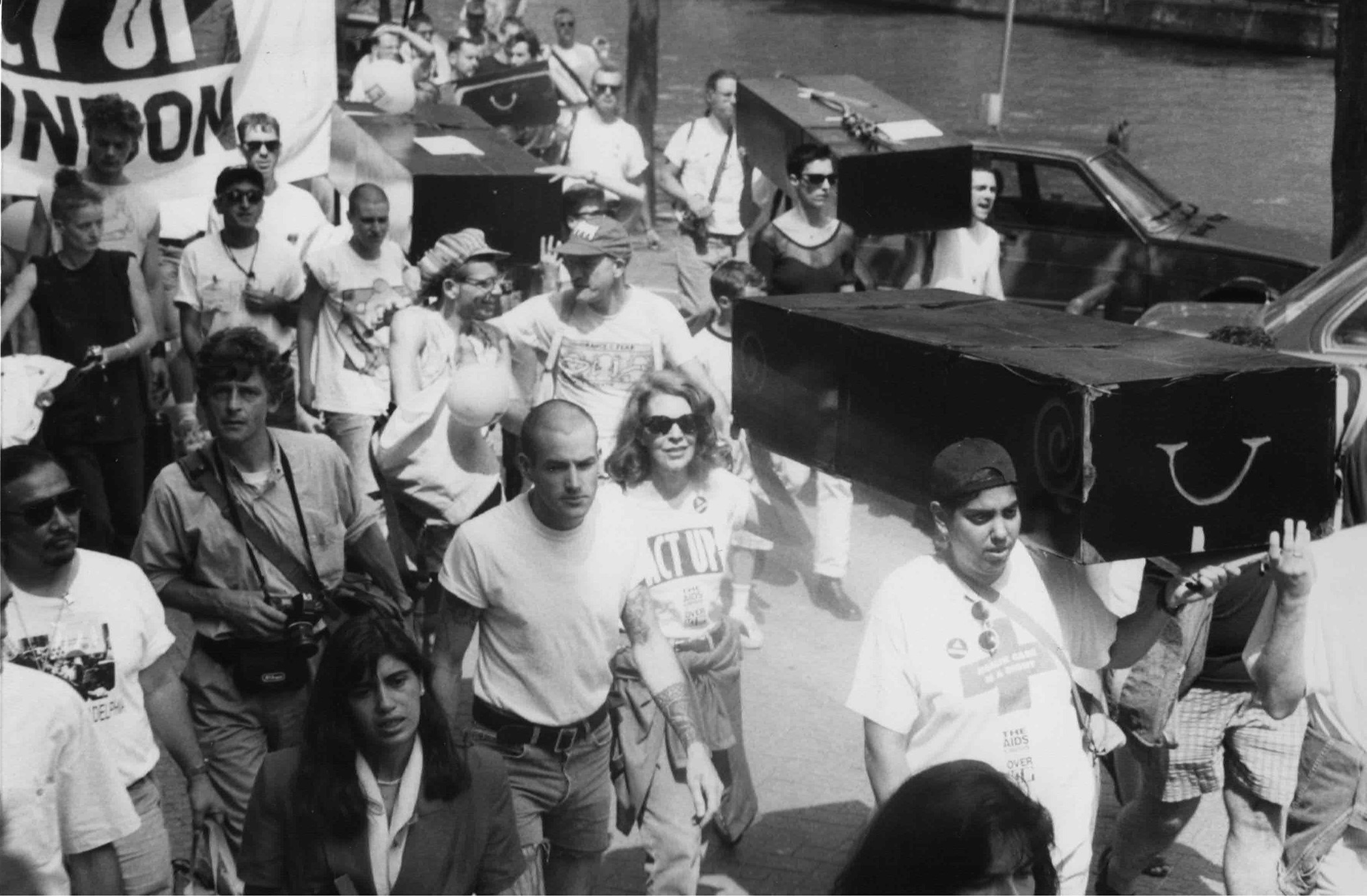
Obituary
Honoring the life and legacy of Coya White Hat-Artichoker
Life-long advocate for Indigenous, two-spirit rights died on Dec. 4
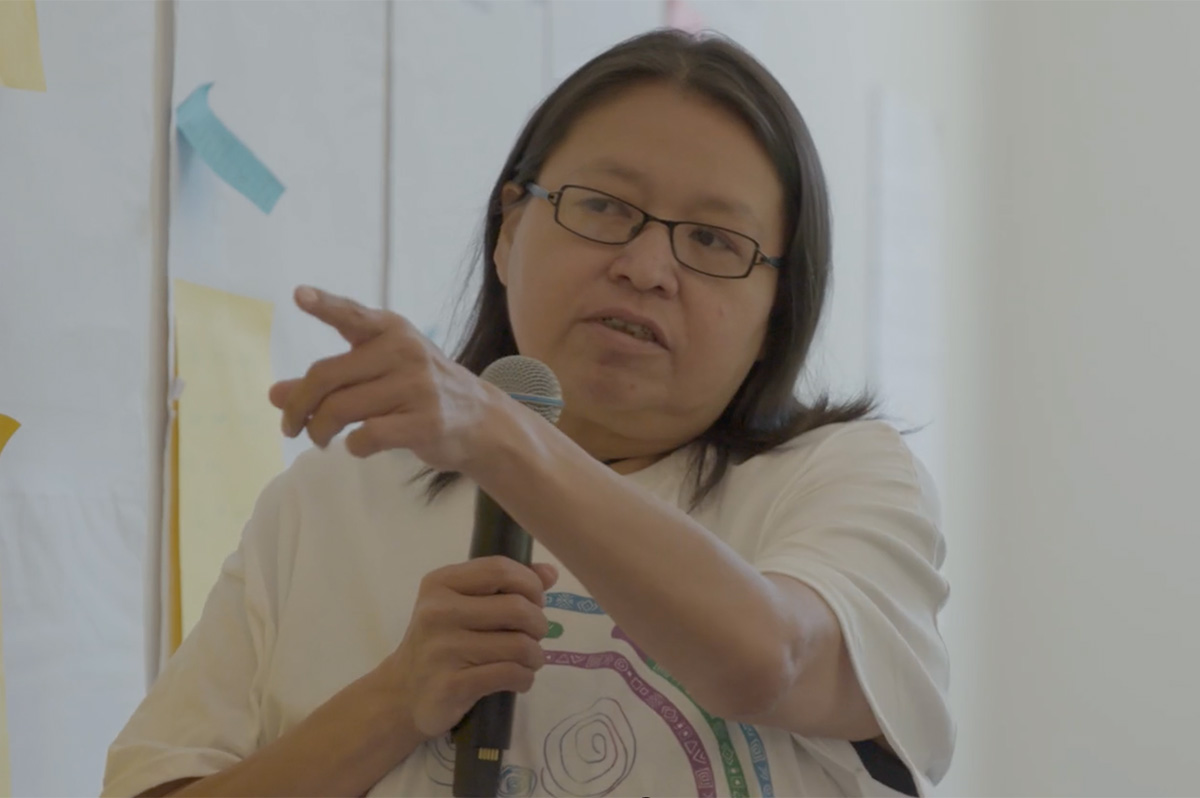
Born and raised on the Rosebud Reservation in South Dakota, Coya was a proud enrolled member of the Sicangu Lakota Oyate or Rosebud Sioux Tribe. From the age of 15, she dedicated her life to advocating for Indigenous and Two Spirit rights, becoming a fierce organizer and a visionary leader in movements for justice. As a founding member of the First Nations Two Spirit Collective, Coya worked tirelessly to uplift Two Spirit youth, support Indigenous reproductive justice, and connect these communities to philanthropic spaces to drive transformative change.
Coya’s advocacy for Indigenous reproductive justice was rooted in a deep understanding of its inseparability from the fight for Indigenous sovereignty. She saw this work as part of a 500-year history of resistance to colonization, weaving together the rights to access abortion, raise children in safe and sustainable environments, steward healthy lands and waters, practice Indigenous cultures, speak ancestral languages, and govern sovereign communities. Recently she served as a board member for SisterSong and the American LGBTQ+ Museum. Coya was a fierce leader who brought dedication and brilliance, impacting gender and reproductive justice efforts around the world.
In 2020, Coya’s visionary leadership brought the world’s first fund dedicated to Indigenous reproductive justice, Building the Fire Fund, into existence. Guided by an Indigenous Advisory Council of women and Two Spirit leaders from across Turtle Island, the fund represents a powerful testament to Coya’s dedication and collaborative spirit. Coya co-authored “Tired of Dancing to Their Song: An Assessment of the Indigenous Women’s Reproductive Justice Funding Landscape” with Zachary Packineau. This seminal report provides a critical roadmap for philanthropy to support and grow the emerging field of Indigenous reproductive justice.
In 2023, Coya brought Building the Fire Fund to Solidaire Network, where we are honored to walk alongside the Advisory Council in advancing this vital work. Coya’s passion, wisdom, and dedication will continue to guide and inspire all of us who were privileged to know her and work beside her.
To honor Coya’s legacy and her vision for the Indigenous reproductive justice movement, we invite you to contribute to the Building the Fire Fund. Your support ensures that her transformative work will continue, lighting the way for generations to come.
Coya White Hat-Artichoker’s life was a powerful testament to resilience, love, and unwavering commitment to justice. While her presence will be deeply missed, her legacy will endure as a beacon of hope and strength for all who carry her vision forward.
Obituary
Gay baseball trailblazer Billy Bean dead at 60
MLB executive was last living former pro player to have come out

He achieved his lifelong dream of becoming a major league baseball player at 23, but Billy Bean gave it all up at 31 because he fell in love with another man. Bean, MLB’s senior vice president for diversity, equity and inclusion, died at home in New York on Tuesday after an 11-month-long battle with acute myeloid leukemia. Major League Baseball announced his death.
Bean was 60, and leaves a husband, Greg Baker.
Bean did not come out publicly until he left the game, in 1999, following an article in the Miami Herald that outed him. That led to even bigger stories in the New York Times and television interviews about being a closeted athlete. He wrote a book, “Going the Other Way.” For decades, Bean was the only living former baseball player to have come out as gay, following Glenn Burke.
Four years ago, Bean recorded an emotional video about coming out and how baseball has changed, titled “Dear Glenn Burke: A Letter from Billy Bean.”
However, the biggest impact Bean had on the game and on all professional sports came in 2014, when he was hired by former Commissioner Bud Selig to be MLB’s first ambassador for inclusion. He spent more than 10 years working for MLB, eventually being promoted to senior vice president.
Bean worked with pro baseball players and their clubs to, in his words, “advance equality for all players, coaches, managers, umpires, employees, and stakeholders throughout baseball to ensure an equitable, inclusive, and supportive workplace for everyone.”
The California native’s athletic career started as a two-time All-American outfielder at Loyola Marymount, then Bean played six seasons of pro ball. He was drafted by the New York Yankees in 1985, but returned to Loyola for his senior year, leading the team to the NCAA Men’s College World Series.
The Detroit Tigers drafted him the following year, and Bean made his debut in 1987 with a four-hit performance that tied a record for a player in his first game. Bean went on to play for the Los Angeles Dodgers, the San Diego Padres, in Japan as well as in the minor leagues.
But he hung up his mitt in 1995, when the lefty outfielder — who at that time was married to a woman — lost his first partner, Sam. He died of HIV-related causes in Bean’s final season. They had fallen in love on a road trip in Miami.
That 1999 Miami Herald article that outed him was a review of the restaurant he co-owned with his partner at that time. He had already told his parents in 1996, but Bean once told the LGBTQ sports site Outsports he still regretted ending his career in the closet.
“If I had only told my parents, I probably would have played two or three more years and understood that I could come out a step at a time, not have to do it in front of a microphone. And I was completely misguided. I had no mentor. I think that’s where the responsibility comes in for people who have lived that experience, and we take for granted that everybody’s adjusted and gets it. I had no one to confide in and that was the biggest mistake of my professional life was to think that if one person knew, everybody knew.
Just having some kind of ally at that time, I think I would have changed and I think I would have played so much better. You can appreciate the degree of despair when you’re hiding something and you’re on the bubble as it is. It just was a really frustrating time for me.”
At MLB, Bean led the charge for baseball teams to hold Pride nights, especially following the COVID-19 pandemic.
“The beginning of Pride month alongside fans returning to our MLB ballparks is tremendously exciting,” Bean told the Los Angeles Blade in June 2021. “The past year has been difficult for everyone, and I am so appreciative that our clubs are able to reach out and support the LGBTQ community in such a positive way.”
The league, baseball teams, his alma mater and LGBTQ advocates and allies posted remembrances and tributes to Bean on social media following news of his passing.
We are deeply saddened by the passing of our friend and colleague Billy Bean, MLB’s Senior VP for Diversity, Equity, & Inclusion and Special Assistant to the Commissioner. Billy, who fought a heroic year-long battle with Acute Myeloid Leukemia, was 60.
Over the last 10 years,… pic.twitter.com/dCfFM6hQlE
— MLB (@MLB) August 6, 2024
We mourn the passing of Billy Bean, a former Dodger and pioneering executive who as MLB’s Senior Vice President for Diversity, Equity & Inclusion truly elevated the culture and spirit of the game he loved. pic.twitter.com/fFykeWFWbi
— Los Angeles Dodgers (@Dodgers) August 6, 2024
We mourn the passing of our friend and former Padre, Billy Bean. He was a great ambassador for equality and inclusion in the game of baseball, and our thoughts are with his loved ones at this very difficult time. pic.twitter.com/D2sFHSVLhO
— San Diego Padres (@Padres) August 6, 2024
The #SFGiants are deeply saddened to learn of the passing of Billy Bean and join the rest of the baseball community in mourning this incredible loss.
We thank Billy for supporting and creating a more inclusive baseball environment and using our collective platform to elevate… https://t.co/tNdMQYCKHk
— SFGiants (@SFGiants) August 6, 2024
We join the entire baseball community in mourning the passing of Billy Bean.
Our hearts go out to the Bean family at this time. 💚💛 https://t.co/6TgKhC5QXp
— Oakland A's (@Athletics) August 6, 2024
The Washington Nationals join Major League Baseball and its Clubs in mourning the passing of Billy Bean.
It was an honor to host him at Nationals Park for our annual Night OUT in 2023, and we thank him for the many contributions he made to our game. pic.twitter.com/8t47tRhhfj
— Washington Nationals (@Nationals) August 6, 2024
The Tigers organization extends its deepest condolences to the family and friends of Billy Bean, who made his Major League debut with the Tigers in 1987 and spent three seasons wearing the Olde English ‘D’. https://t.co/BiB0pKpEbj
— Detroit Tigers (@tigers) August 6, 2024
Billy Bean brought all of his heart to this game. His courage changed baseball for the better, championing inclusivity and belonging.
Thank you for your friendship, energy and inspiration. You made us a better organization. We will miss you. ❤️ https://t.co/blhQNPJ2VO pic.twitter.com/EpBluffmYM
— Red Sox (@RedSox) August 6, 2024
Billy Bean left an indelible mark with his kindness, sincerity and tireless efforts to advance the causes of diversity and inclusion in baseball. The Players Association extends its heartfelt sympathies to his family and friends throughout the game. pic.twitter.com/6KHvcv4ZcR
— MLBPA (@MLBPA) August 6, 2024
The LMU community mourns the passing of Lions baseball legend Billy Bean.
The two-time All-American led the Lions to their sole appearance in the College World Series in 1986.
Bean was inducted into the LMU Hall of Fame in 1992 and will forever be enshrined in Lions lore. pic.twitter.com/QwJbt3Rfhp
— LMU Baseball (@lmulionsBSB) August 6, 2024
I just learned that Billy Bean is now gone on the same day we buried my father. I always loved working with Billy because, former big leaguer that he was, he was committed to finding positive outcomes, ways to win, big or small, for all #LGBTQ athletes. We should all miss him. pic.twitter.com/F3d2EKjAtL
— Christina Kahrl (@ChristinaKahrl) August 6, 2024
It's a sad day for all sports. Baseball Legend Billy Bean, MLB’s Senior VP for Diversity, Equity, and Inclusion and Special Assistant to the Commissioner, has passed away. Billy, who was 60, fought Acute Myeloid Leukemia.
— R.K. Russell (@RKRelentless) August 6, 2024
Heartbroken to hear of Billy’s passing. A kind man with a formidable enthusiasm for creating change. I’m so grateful for all the times our paths crossed over the years. I’ll always cherish the wisdom he so generously shared that helped shape me into the man & advocate I am today. https://t.co/JtSQDKgMh8 pic.twitter.com/MxRjOJRfQX
— Merts (@ConnerMertens) August 6, 2024
Funeral arrangements were not announced as of press time.
Obituary
Out American composer & lyricist Stephen Sondheim dies at 91
Sondheim did not come Out until age 40 & didn’t live with a partner until he was 61 when he was in a relationship with dramatist Peter Jones

ROXBURY, Ct. – The man who was heralded as Broadway and theater’s most revered and influential composer-lyricist of the last half of the 20th century with eight Tony awards alone, Stephen Joshua Sondheim, known for landmark musicals such as “Company,” “West Side Story” and “Sweeney Todd, has died at 91.
Sondheim’s death was announced by his attorney, Rick Pappas. who said that the composer died Friday at his home in Roxbury, Connecticut. The day before Sondheim had celebrated Thanksgiving with a dinner with friends in Roxbury, Pappas added.
Stephen Sondheim, the revered and influential composer-lyricist behind some of Broadway’s most beloved and celebrated shows, has died at 91. https://t.co/LDynQNwHrr
— New York Times Arts (@nytimesarts) November 26, 2021
An online listing of Sondheim’s accolades include nine Tony Awards (including a Lifetime Achievement Tony in 2008), an Academy Award, eight Grammy Awards, a Pulitzer Prize, a Laurence Olivier Award, and in 2015, the Presidential Medal of Freedom bestowed on him by former President Barack Obama.
He has a theatre named for him on both Broadway and the West End in London.
Sondheim has written film music, contributing “Goodbye for Now” for Warren Beatty’s 1981 Reds. He wrote five songs for 1990’s Dick Tracy, including “Sooner or Later (I Always Get My Man)”, sung in the film by Madonna, which won the Academy Award for Best Original Song.
Film adaptations of Sondheim’s work include West Side Story (1961), Gypsy (1962), A Funny Thing Happened on the Way to the Forum (1966), A Little Night Music (1977), Gypsy (1993), Sweeney Todd: The Demon Barber of Fleet Street (2007), Into the Woods (2014), West Side Story (2021), and Merrily We Roll Along (TBA).
Sondheim did not come Out until he was 40 and did not live with a partner until he was 61 when he was in a relationship with dramatist Peter Jones. His current partner, actor-producer Jeff Romley, whom he married in 2017 and he had been living together for over 6 years at the time of the composer’s death.
David LaFontaine, a professor at Massasoit Community College, wrote about Sondheim’s early years and the critical friendship that would end up impacting his life, career, and American Theatre;
“Stephen Joshua Sondheim was born in New York City on March 22, 1930, the only child of affluent parents who divorced when he was ten. He believes he might have succumbed to depression had it not been for a friendship that began in the summer of 1941 with the Hammerstein family, who lived near Sondheim on the bucolic Highland Farm in Bucks County, Pennsylvania.
“Dorothy and Oscar Hammerstein became my surrogate parents during my teen years,” says Sondheim, “and that’s essentially how I became a songwriter, because I wanted to do what Oscar did.” During his four years as a student at the George School, Stevie, as he was then called, often spent entire summers at the Hammerstein farm.”
Oscar Hammerstein II was an American lyricist, theatrical producer, and director in the musical theater for almost 40 years. He won eight Tony Awards and two Academy Awards for Best Original Song. Hammerstein along with his partner composer Richard Rodgers created some of the notable musicals in Broadway history including Oklahoma! (1943), South Pacific (1949), The King and I (1951), and The Sound of Music (1959).
This past September Sondheim was a guest on The Late Show with Stephen Colbert, for a conversation that covers a lot of ground, from “Company” to “West Side Story,” to a new show titled, “Square One.”
Stephen Sondheim Is Still Writing New Works, As “Company” Returns To Broadway
Obituary
First trans mayor, Stu Rasmussen, dies at 73
Rasmussen, who used both he/him and she/her pronouns, became the first trans mayor in the nation’s history
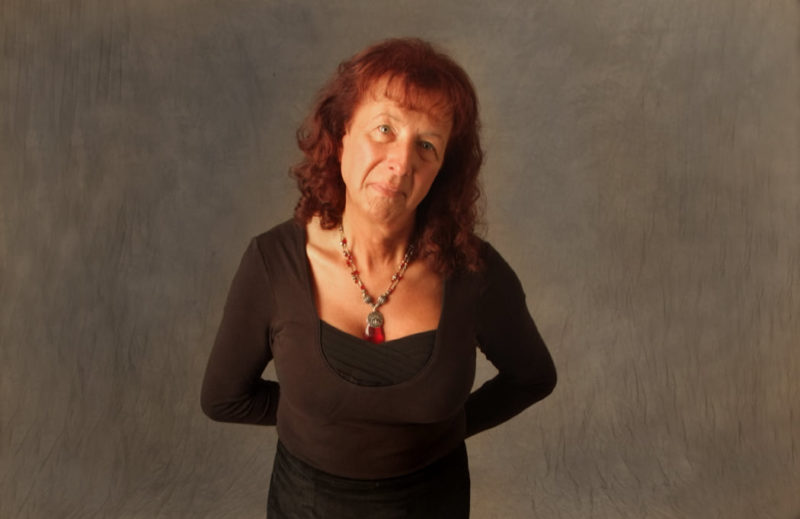
SILVERTON, Or. — Stewart “Stu” Rasmussen, the first trans mayor in the United States, died on November 17 after several weeks under home hospice care battling metastatic prostate cancer. He was 73.
Rasmussen, who used both he/him and she/her pronouns, became the first trans mayor in the nation’s history when he was elected to lead the town of Silverton, Oregon, in 2008, serving until 2014. Before coming out as trans, he served as mayor of the western Oregon town for two terms starting in 1988.
The current mayor of Silverton, Kyle Palmer, took to Facebook to announce the news and offer his condolences.
“Throughout his career as an elected official, Stu advocated for many things on behalf of those who shared his vision for Silverton,” Palmer wrote. “Although citizens can debate their support or lack of support for some of those visions, the time for those conversations has long passed. His volume of service to city government, his role as a longtime downtown business owner, and his impact on the LGBTQ population in Silverton and beyond leaves a huge legacy behind.”
Rasmussen, a self-described “gender anarchist,” leaves behind his partner Victoria Sage, who he began dating in 1974 and married in 2014.
According to Palmer’s Facebook post, Sage noted that “he went bravely into the unknown on his own terms.”
In an email to the Statesman Journal, Sage said that she received many “beautiful and heartwarming” letters from people who said Rasmussen touched their lives.
Born and raised in Silverton, Rasmussen inspired many with his historic 2008 election. His historic 2008 election was covered nationally by People Magazine and Good Morning America. His story was the subject of a stage production in Seattle titled “Stu for Silverton.”
“He set an example for members of our community who needed to see that it was safe to live their lives openly in our community,” said Palmer.
According to Palmer, Westboro Baptist Church, known for anti-LGBTQ+ picketing, protested Rasmussen’s election in 2008. But they were met with a large crowd of Silverton residents — many of them wearing dresses — who supported the mayor, demanding congregation members leave town.
Along with public service, Rasmussen also ran a theater in Silverton for most of his life, “managing to preserve the magic of a small town theater even while showcasing the blockbusters that arrived in the late 70’s and navigating the frustrations of studio restrictions that made it harder and harder to turn a profit,” Palmer noted.
“I’m comforted in the knowledge that he is no longer in pain,” said Palmer.
Obituary
Veteran AIDS activist & TV-film-stage producer Scott Robbe dies at 66
“He was a fearless activist, always on the front lines, whether he was protesting pharmaceutical company greed or homophobia at the Oscars”
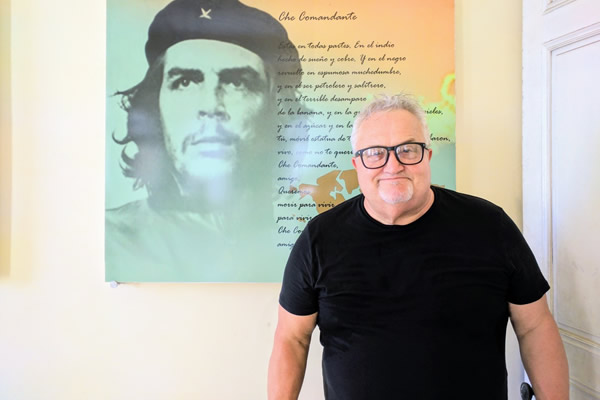
By Jay Blotcher | NEW YORK – Veteran progressive activist and TV-film-stage producer Scott Robbe died on Sunday, Nov. 21, 2021, according to a statement by Paul Algiers, a longtime friend and the executor of Scott Robbe’s estate. Robbe was in hospice care at the home of his sister, Angela, in Hartford, Wis. He was 66.
Robbe died of complications from Myelodysplastic Anemia, a blood cancer he had battled for more than a year. He had undergone stem-cell treatment at Dana-Farber Cancer Institute in Boston in April of this year.
Robbe was a prominent member in the founding of two direct-action groups in New York City: ACT UP and Queer Nation. Robbe was a member of an ACT UP undercover team, led by activist Peter Staley, that secretly gained access to the New York Stock Exchange in September 1989. Their goal was to protest and publicize the record high price of AZT, then the sole approved treatment for HIV/AIDS. Burroughs Wellcome eventually bowed to this nationally publicized activist pressure and lowered its drug price — then the highest in medical history — by 20 percent.
“Scott was a fearless activist, always on the front lines, whether he was protesting pharmaceutical company greed or homophobia at the Oscars,” said ACT UP New York veteran Ann Northrop. “And he was a total sweetheart.”
“Scott was one of those activists who didn’t flinch when our lawyers would warn us of all the possible charges and maximum sentences we’d face for infiltrating a powerful institution,” said Peter Staley, who chronicled his ACT UP days in the new memoir, “Never Silent”. “When it came to fighting for his dying gay brothers, he’d always reply, ‘I’m in.’”
In 1991, Robbe relocated to the West Coast and co-founded Out in Film, a Los Angeles-based group to battle homophobia in Hollywood filmmaking. At the time, several high-grossing films offered stereotypic and unflattering depictions of gay characters, including Jonathan Demme’s “Silence of the Lambs”, Oliver Stone’s “JFK” and Paul Verhoeven’s “Basic Instinct”.
Out in Film demanded equity for LGBTQ people on both sides of the camera. Robbe and Lesbian Avengers member Judy Sisneros created a pioneering protest at the Oscar Awards in March 1991, during which demonstrators outside the Dorothy Chandler Pavilion called for increased queer visibility and fairness in career opportunities.
The Oscars protest was one highlight of a life devoted to progressive activism. It began in his teen years, when Robbe took part in 1960s marches for the environment, for civil rights and against the Vietnam War. Over the four decades that followed, Robbe’s career encompassed both community organizing and producing dozens of works in theatre, film and television.
Scott Douglas Robbe was born on Feb. 16, 1955, in Decorah, Iowa, to Helen, a homemaker, and James Robbe, a construction supervisor. The family relocated to Hartford, Wis., the following year. Robbe was a graduate of Hartford Union High School in Hartford, and entered the University of Wisconsin, Madison, in 1974, where he majored in theater arts. Located in the state capital, the college was known for its progressive student population, and Robbe took part in numerous protests.
After he graduated in 1978, Robbe moved to New York City, where he met his first boyfriend, a Bennington College student. They lived together in the East Village from 1978 to 1984. At the time, Robbe was helping to renovate the Orpheum Theatre on Second Avenue in the East Village. At the same time he produced at the neighboring Entermedia Theatre his first theatrical production, “False Promises” by the San Francisco Mime Troupe. At the famed La MaMa ETC, Robbe workshopped Harvey Fierstein’s “Fugue in a Nursery,” which forms the middle segment of “Torch Song Trilogy.” That production won wide acclaim both there and after it moved to the Orpheum Theater. Robbe also produced several plays off-Broadway, followed by the Harvey Fierstein play “Safe Sex” on Broadway.
Robbe joined ACT UP New York after seeing the group protest at the White House in October 1987 during the Second National March on Washington for Lesbian and Gay Rights. He joined the group’s Media Committee and took part in numerous protests. He also joined the newly-formed Queer Nation in March of 1990, helping to mount demonstrations across New York City aimed at queer visibility. Robbe was diagnosed as HIV-positive in the early 1990s.
In late 1990, Robbe relocated to Los Angeles to produce TV commercials for Japanese television. His first film job was an associate producer role for 1982’s “In the King of Prussia”, depicting the Berrigan Brothers’ pioneering anti-war efforts and starring Martin Sheen.
Robbe’s extensive television credits include the first-ever LGBTQ comedy special for Comedy Central in 1993, called “Out There,” and hosted by Lea DeLaria. Robbe was on the creative team for the groundbreaking 2003 series “Queer Eye for the Straight Guy.” He also produced shows for Lifetime, Comedy Central, VH1, Children’s Television Workshop and American Playhouse.
In 2005, Robbe was named executive director and film commissioner for Film Wisconsin, Inc. During his tenure, Robbe brought 28 TV and film projects to the state, including the 2009 film “Public Enemies” by Michael Mann, starring Johnny Depp and Channing Tatum. Most recently, Robbe worked with activists in Cuba to bring pressure on the American government to distribute the COVID-19 vaccine in the country. Robbe was also involved in grassroots activism in Puerto Vallarta, Mexico, where he had a second home.
Scott Robbe is survived by his mother, Helen, and his siblings and their spouses, Royce (Donna), John (Ken Hall), Jay (Francine), and Angela. Also surviving him are his uncle Peter Coffeen (Steve Getz), as well as several nieces, nephews and cousins.
There will be no funeral. Arrangements were handled by Milwaukee Cremation Society. A celebration of Robbe’s life will be broadcast online early in 2022. Donations in Scott’s memory may be made to Broadway Cares/Equity Fights AIDS and ACT UP New York.
********************
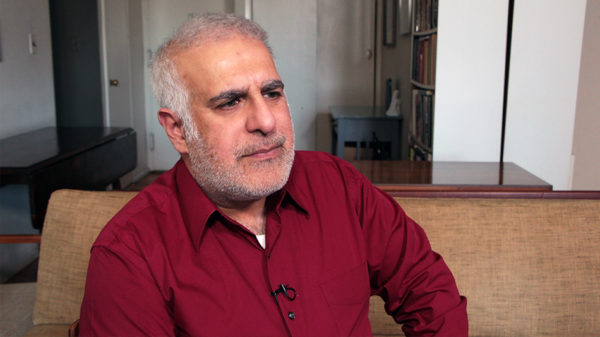
Jay Blotcher is an American activist, journalist, and editor. He was active in the AIDS Coalition to Unleash Power in its early years, serving as chair of the media committee, and was a founding member of Queer Nation.
Photo via ‘I’m From Driftwood’ LGBTQ+ stories video archive.
********************
Obituary
Former PFLAG president Paulette Goodman dies at 88
Beloved LGBTQ community ally grew up in Nazi occupied Paris
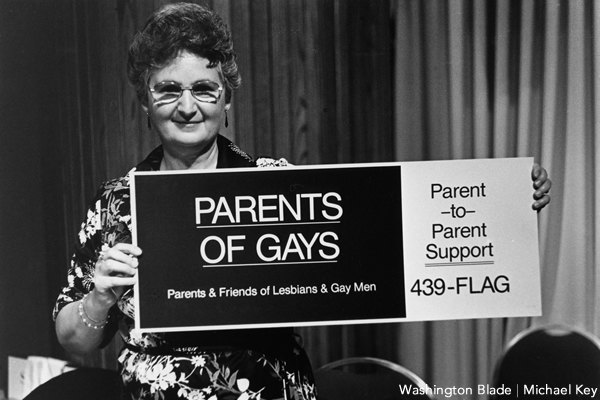
WASHINGTON – Paulette Goodman, a nationally recognized advocate for LGBTQ people and their families in her role as president of the national group Parents, Friends and Families of Lesbians and Gays (PFLAG) from 1988 to 1992 and her earlier role as the lead founder of PFLAG’s Metro DC chapter in 1983, died Aug. 15 of natural causes at her residence at the Riderwood retirement community in Silver Spring, Md. She was 88.
In an Aug. 16 statement, the national PFLAG group said Goodman was born into a Jewish family and grew up in Nazi occupied Paris until the family moved to the United States in 1949. People who knew Goodman have said her experience growing up in an atmosphere of potential danger to her and her family helped shape her response when her daughter came out to her as a lesbian in 1981.
Goodman first became involved with PFLAG in 1981 and helped to found the PFLAG Metro D.C. chapter in 1983, serving as its first president.
During her tenure with the local PFLAG group Goodman counseled families of LGBT people, answered calls on the PFLAG helpline, and led a campaign to display PFLAG ads on D.C. area Metro buses, according to the National PFLAG group.
She later appeared on radio and TV news programs and was the subject of stories in local newspapers, including the Washington Blade, which reported on her efforts to lobby the Maryland General Assembly and the U.S. Congress in support of LGBTQ equality. She also helped to start other PFLAG chapters in Delaware, Maryland, Virginia, and West Virginia.
In its statement on Goodman’s passing, the national PFLAG group points to a 2019 interview that Goodman gave to The Atlantic magazine in which she told how her own upbringing in Nazi occupied France shaped her response to her daughter, Cynthia Goodman’s, coming out.
“When I found out about my gay child, I realized it was the same situation,” The Atlantic quoted her as saying. “You’re guarded about who you are, because you don’t know who’s going to be supportive…I didn’t want my child to go through what I went through – being in the closet is stifling.”
The PFLAG statement says, “It was her understanding, passion, and success with PFLAG Metro D.C…that led PFLAGers to vote her in as president of the national organization.”
The statement notes that in her role as national PFLAG president, Goodman drew national attention to the issues facing LGBTQ people and their families when she wrote to then first lady Barbara Bush to tell of her experience as a parent to a gay child during the peak of the AIDS epidemic. In her letter, she asked Bush to “speak kind words to some 24 million gay Americans and their families, to help heal the wounds and to keep these families in loving relationships.”
In a development that created a stir in Republican political circles and the White House, Bush responded with her own letter, which stated, “I firmly believe that we cannot tolerate discrimination against any individuals or groups in our country. Such treatment brings with it pain and perpetuates intolerance.”
According to the PFLAG statement, Bush’s letter, which was inadvertently given to the Associated Press, caused a “political maelstrom” but was possibly the first gay-positive comment to come from the White House during the administration of President George H.W. Bush.
In her later years, the PFLAG statement says, Paulette Goodman retired but continued her advocacy work by, among other things, starting the first-ever chapter of PFLAG at her retirement home at Riderwood in Silver Spring along with a fellow PFLAG member.
In 2013, Goodman received recognition of her work with PFLAG from officials in Montgomery County, Md., where she lived, and from then Maryland Gov. Martin O’Malley. She received numerous other honors of recognition from organizations that include the Human Rights Campaign, the Association of Gay and Lesbian Psychiatrists, the Greater New York Bar Association for Human Rights, and the LGBTQ Catholic group Dignity Washington.
“Paulette Goodman showed the world what it means to be a loving PFLAG parent and ally,” said PFLAG National Executive Director Brian K. Bond. “PFLAGers everywhere can look to her as a role model, for once she went through her experience with her own child and got the support she needed, she used that experience to educate others and then advocate for the wellbeing and equality of all LGBTQ+ people,” Bond said.
“She was the embodiment of what we tell PFLAG members,” said Bond. “Once you no longer need PFLAG, PFLAG needs you,” he said. “PFLAG needed – and was so lucky to have – Paulette Goodman. Our hearts are with her family and all who knew and loved her.”
Goodman was predeceased by her husband, Leo Goodman. She is survived by her daughter Cynthia Goodman and son Claude Goodman and his wife Toni Goodman; her grandson Max Goodhart and his wife Laurel Goodhart; her granddaughter Hannah Goodman; her niece Sue Einhorn; and her longtime friends Millie Spector, Tom Bull, David Feltman, and Peter Froehlich.
No immediate plans were announced for a memorial tribute or funeral arrangements.
Obituary
First United States Gay Ambassador James C. Hormel dies at 88
“Jim Hormel was a barrier-breaking public servant, champion for LGBTQ equality, and cherished friend who will be dearly missed.”
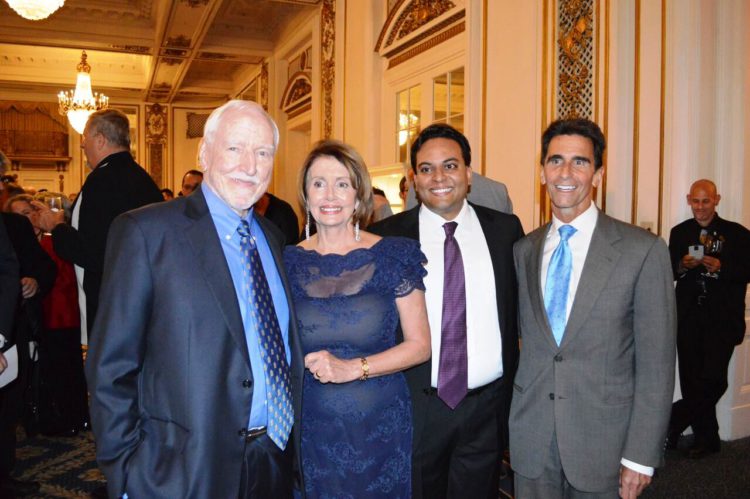
SAN FRANCISCO – The first openly gay diplomat appointed as the United States Ambassador to Luxembourg in 1999 by President Bill Clinton, has died at 88. James C. Hormel, heir to the Hormel meatpacking fortune, was a longtime philanthropist who parlayed his financial interests and contributions as a longtime Democratic Party activist and donor, into actively pursuing LGBTQ+ equality and civil rights.
“We are deeply saddened by the passing of Ambassador Jim Hormel. Jim devoted his life to advancing the rights and dignity of all people, and in his trailblazing service in the diplomatic corps, he represented the United States with honor and brought us closer to living out the meaning of a more perfect union,” former President Bill Clinton and his wife, former U.S. Secretary of State Hillary Clinton said in a joint statement. “We will always be grateful for his courageous and principled example, as well as the kindness and support he gave us over so many years. Our thoughts are with his family and all who loved him.”
Hormel’s work as an openly gay supporter for equality led to his being one of the founders of the Human Rights Campaign Fund along with fellow native Minnesotan Steve Endean. In 1995 the organization was renamed the Human Rights Campaign.
A long time San Franciscan, Hormel served as a member of the board of directors of the San Francisco Chamber of Commerce and the American Foundation for AIDS Research. He also founded and funded the James C. Hormel LGBTQIA Center located at the San Francisco Public Library.
Two notable national Democratic Party political figures and fellow San Franciscans, U.S. Senator Diane Feinstein and U.S. House Speaker Nancy Pelosi reflected on Hormel’s long service.
Sen. Feinstein’s statement read in part, “San Francisco lost a great friend today. A philanthropist, civil rights pioneer and loving spouse and father, James Hormel lived an extraordinary life and will be deeply missed by many, Feinstein said. I had the pleasure of working closely with him on several issues, most notably on the 1984 Democratic National Convention in San Francisco. Tapped to be the ambassador to Luxembourg by President Clinton in 1997, he was the first openly gay person to serve as an ambassador. While his nomination was controversial at the time, his service was distinguished and helped advance LGBTQ rights both at home and abroad.”
House Speaker Pelosi released a statement praising Ambassador Hormel’s commitment to advancing LGBTQ+ Equality rights.
“Jim Hormel was a barrier-breaking public servant, champion for LGBTQ equality, and cherished friend who will be dearly missed in San Francisco, in our nation and around the world. Jim Hormel made history as the first openly gay U.S. ambassador, showing the world how the voices of LGBTQ Americans are integral to foreign policy, and paving the way for a new generation of leaders,” said Pelosi. “With his gentle yet powerful voice and undaunted determination, Jim made it his mission to fight for dignity and equality for all. Paul and I are heartbroken at this tremendous loss, and hope it is a comfort to his husband, Michael, and his children Alison, Anne, Elizabeth, James Jr. and Sarah, that Jim’s extraordinary life continues to serve as a beacon of hope and promise for LGBTQ children across our country and around the world.”
Born at the height of the Great Depression in January of 1933, Hormel, the grandson of Hormel Foods founder George A. Hormel, earned his bachelor of Arts Degree from Swarthmore College in suburban Philadelphia and later a law degree from University of Chicago Law School. He later served as the school’s Dean of Students and Director of Admissions.
Hormel’s Democratic Party activism coupled with his dedicated efforts to advance the cause of LGBTQ equality led to a chance dinner conversation in 1992 with then candidate Bill Clinton’s campaign treasurer, Bob Farmer.
Cynthia Laird, the editor of The Bay Area Reporter, San Francisco’s LGBTQ newspaper noted Hormel’s recounting that conversation which was originally published in B.A.R. in 2016;
Over dinner, Farmer suggested to Mr. Hormel that he seek a presidential appointment as an ambassador.
“I was quite surprised when he brought up the idea,” said Mr. Hormel, noting that over 60% of such positions are held by career employees who have come up through the ranks in the Foreign Service.
The appointment did not happen easily, Mr. Hormel recalled.
In fact, it wasn’t until five years after that dinner that Clinton nominated Mr. Hormel for the job. During that period, recalled Mr. Hormel, he made “dozens of visits and hundreds of phone calls” to keep his name in consideration.
Mr. Hormel said he was persistent because, if appointed, “I would break a ceiling and make it easier for gay people to serve at the highest levels of government.”
Initially, Hormel was considered for an ambassadorship to Fiji by the Clinton White House, but according to published accounts in the Washington Blade, D.C.’s LGBTQ newspaper and the Washington Post in December of 1994, his name was withdrawn from consideration in part due to objections from conservatives in both parties on Capitol Hill and the government of Fiji itself.
The Washington Blade’s Lou Chibbaro reported; “The action on Hormel also comes after members of the moderate and conservative wings of the Democratic Party have said the stunning defeat last month of Democratic members of Congress was due, in part, to Clinton’s support for Gay civil rights in general and Gays in the military in particular.“
Fijian officials had protested in part because same-sex intimate sexual relations were a crime punishable by long prison sentences and Hormel’s status as an openly gay man ran counter to the principles of “Fijian Culture” they claimed.
“Hormel’s nomination as ambassador to Fiji would be “dead in the water,” said one source familiar with the controversy, who spoke on condition of anonymity,” the Blade reported. “The source said Helms made it clear through intermediaries that he would bottle up Hormel’s nomination in committee.
The Blade also reported that; “The only reason Jim Hormel did not get the job was because he is Gay,” said one Gay activist leader, who spoke on condition that he not be identified.”
The Clinton Administration according to the Washington Post then explored another appointment for Hormel that would not require Senate confirmation. One option under consideration, the Post reported, was a position in a delegation to an international conference on social justice issues in Copenhagen. Another possibility, the Post said, was participation by Hormel in the United Nations commission on human rights in Geneva.
President Clinton ultimately named Hormel as a member of the United States delegation to the United Nations Human Rights Commission in 1995, and in 1996 Hormel was named an alternate U.S. representative at the United Nations General Assembly.
The following October of 1997, the president nominated Hormel as his choice to be the U.S. Ambassador to the principality of the Grand Duchy of Luxembourg. While the Senate Foreign Relations Committee approved his nomination with the exceptions of Republican conservative Senators Jesse Helms and John Ashcroft opposed, the battle in the Senate which got progressively uglier as contentious portions of Hormel’s philanthropic and activist work were derided by more conservative Republicans and the powerful political foes of LGBTQ+ equality rights.
Those groups included the Southern Poverty Law Center’s designated extremist anti-LGBTQ hate groups, the Washington D.C. based Family Research Council and the Orange County, California based Traditional Values Coalition Christian organization founded by Rev. Louis P. Sheldon to oppose LGBTQ+ rights.
In a Wikimedia entry on Hormel it notes that FRC and TVC both:
- Labelled Hormel as being pro-pornography, asserting that Hormel would be rejected in the largely Roman Catholic Luxembourg. It was later observed that much of the same material could also be found in the Library of Congress.
- The FRC distributed video tapes of a television interview with Hormel at the 1996 San Francisco Pride parade in which Hormel laughed at a joke about the Sisters of Perpetual Indulgence, a group of men who dress in drag as nuns to mock religious conventions, as they passed by. The Catholic League took this as an indication of approval of what they characterized as an anti-Catholic group. In a meeting with Tim Hutchinson, Hormel declined to repudiate the Sisters. In an interview years later, Hormel objected to the idea that the video clip showed that he approved of the group and that he was anti-Catholic.
- It was revealed that Hormel had contributed $12,000 to fund the production of the It’s Elementary: Talking About Gay Issues in School, a video aimed at teaching tolerance of homosexuality to grade-school students. This especially inflamed Senator Bob Smith of New Hampshire, who was portrayed unflatteringly in the film. Smith contended that he opposed Hormel not because he was gay but because of his “advocacy of the gay lifestyle”.
Ultimately after Republicans were successful in stalling Hormel’s nomination, preventing a vote which was orchestrated by then Senate Majority Leader, Mississippi Republican U.S. Senator Trent Lott, President Clinton in May of 1999 in a recess appointment made Hormel the U.S. Ambassador to Luxembourg.
The Washington Post reported, “Bypassing Senate confirmation, President Clinton moved yesterday to directly install gay San Francisco businessman James C. Hormel as ambassador to Luxembourg.
The president invoked a provision of the Constitution allowing him to make such appointments during a congressional recess. Hormel, who will become the first openly gay U.S. ambassador, can serve in the post through the end of 2000.
The “recess appointment” drew criticism from a spokesman for Senate Majority Leader Trent Lott (R-Miss.) and conservative groups but was praised by gay rights activists.
“The denial of a confirmation vote by the Senate leadership, a vote he would have easily won, was nothing more than anti-gay discrimination,” said Elizabeth Birch of the Human Rights Campaign, the nation’s largest gay and lesbian political group to the Washington Post.
The Post also reported that Clinton’s recess appointment of Hormel was criticized by Lott spokesman John Czwartacki who said it was “a slap in the face,” particularly to Catholics.
Czwartacki cited what he said were Hormel’s links with the Sisters of Perpetual Indulgence — drag queens who dress as nuns.
White House spokesman Barry Toiv said Hormel does not support “any such group. The idea . . . is outrageous and is false.”
The Family Research Council claimed that Hormel’s appointment was strictly to “advance the gay agenda.” on what the anti-LGBTQ+ hate group deemed a “a government-sanctioned platform.”
Hormel went on to serve as ambassador until the inaugural of President George W. Bush on January 20, 2001.
After his service as ambassador Hormel returned to his philanthropic work moving back to the City by the Bay where he was honored in 2010, with a lifetime achievement grand marshal for the San Francisco Pride parade.
Hormel also continued his lifelong advocacy work and as an elder statesmen in the Democratic Party. When then President-elect Joe Biden announced his choice of nominating openly out Pete Buttigieg as U. S. Secretary of Transportation, the Washington Blade’s White House reporter Chris Johnson reported, “Buttigieg, who made history as a gay Democratic candidate in the 2020 primary said at the time his career aspiration was to become an airline pilot and “was a long way from coming out, even to myself,” but gained knowledge from Hormel’s story.”
The Blade also reported; “I learned about some of the limits that exist in this country when it comes to who is allowed to belong, and just as important, I saw how those limits could be challenged,” Buttigieg said. “So, two decades later, I can’t help but think of a 17-year-old who might be watching right now, someone who wonders whether and where they belong in the world, or even in their own family, and I’m thinking about the message today’s announcement is sending to them.”
Hormel, in an email to the Blade the day after Buttigieg praised him, was able to return the favor by offering support.
“I enthusiastically support the nomination of Pete Buttigieg as secretary of transportation and will acknowledge him as the first openly LGBTQ member of the presidential Cabinet,” Hormel said.
“Today we mourn the loss of a true titan in our LGBTQ+ movement — a trailblazer, a mentor and a friend to all those who sought his counsel during his decades of leadership and advocacy. Ambassador James Hormel defined our community’s resilience — representing our nation with honor and distinction in the face of vile hate and discrimination,” Executive Director of Equality California’s Rick Chavez Zbur said in a statement. “In the years since his diplomatic service, Jim has been unyieldingly generous with his time and his resources, working tirelessly to create a world that is healthy, just and fully equal for all LGBTQ+ people.
“It is true that we stand on the shoulders of the giants who came before us. I am forever grateful for the wisdom and guidance that Jim shared with me and Equality California over the past 25 years, and I am confident that generations of LGBTQ+ diplomats, advocates and community leaders will benefit from his life’s work. I know that we will continue to see the immeasurable impact of his contributions on the faces of children who dream of walking the world’s greatest halls of power without worry that who they are or whom they love could ever limit their potential.”
The White House Friday afternoon released a statement by Vice President Kamala Harris on the death of Ambassador Hormel;
“During his remarkable life, Ambassador James Hormel made history – and he made the world a better place. Jim’s kindness and commitment to human rights, including his efforts to help found the Human Rights Campaign and advocate for those living with HIV/AIDS, changed lives and inspired generations of leaders. As our country’s first openly gay ambassador, Jim’s distinguished service represented the very best of America and paved the way for others. I will always be grateful for Jim’s friendship and counsel over many years. He will be missed. Doug and I send our condolences to Jim’s husband Michael, children Alison, Anne, Elizabeth, Jimmy, and Sarah, and grandchildren and great-grandchildren.”
President Biden, reflecting the recent passing of James Hormel, the first openly gay person to serve as U.S. ambassador gay person to the United States, said his “bravery paved the way” for LGBTQ appointees now working for the U.S. government.
“I am proud that my Administration is staffed by incredible LGBTQ+ public servants at all levels, including in my Cabinet and nominees for Ambassador-level appointments,” Biden said. “Ambassador Hormel’s bravery paved the way for all of them to serve, just as he hoped it would.”
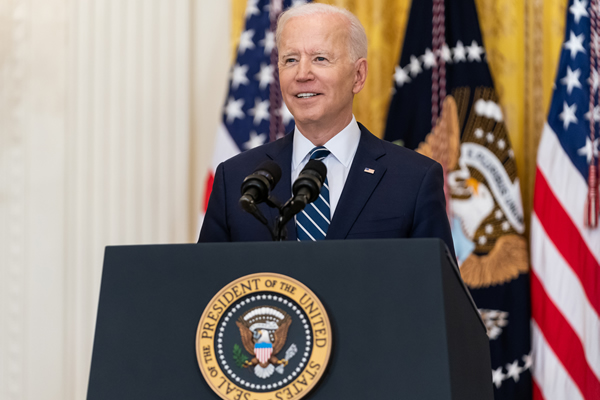
Biden made the remarks in a statement late Friday following the death of Hormel, whom former President Clinton appointed as U.S ambassador to Luxembourg by recess appointment in 1999.
Statement by President Joe Biden on the Passing of Ambassador James Hormel
Ambassador Hormel was a man of incredible dignity and backbone, a national leader in the fight for LGBTQ+ equality, an early advocate for those suffering from HIV/AIDS, and a ground breaking diplomat who helped America to lead by the power of our example.
Ambassador Hormel put himself on the line to become our nation’s first out gay Ambassador in the face of unwarranted and hurtful opposition. I remember well the historic fight for his appointment, and I was proud to support his confirmation. He helped shine a national spotlight on the truth that no LGBTQ+ individual should be denied their basic human rights, and that the United States should be the global leader in that fight.
Today, I am proud that my Administration is staffed by incredible LGBTQ+ public servants at all levels, including in my Cabinet and nominees for Ambassador-level appointments. Ambassador Hormel’s bravery paved the way for all of them to serve, just as he hoped it would. Jill and I send our deepest condolences to Ambassador Hormel’s husband, Michael, his children and grandchildren, and all those mourning his loss.
Hormel is survived by his husband Michael and his children Alison, Anne, Elizabeth, James Jr. and Sarah.
Additional reporting from Lou Chibbaro, Chris Johnson, The Bay Area Reporter, and The Washington Post.
Obituary
Kay Lahusen, LGBTQ equality rights pioneer has died at 91
Kay was the first out LGBTQ photo journalist, an author and partner of her beloved Barbara Gittings. They were pioneers in LGBTQ activism
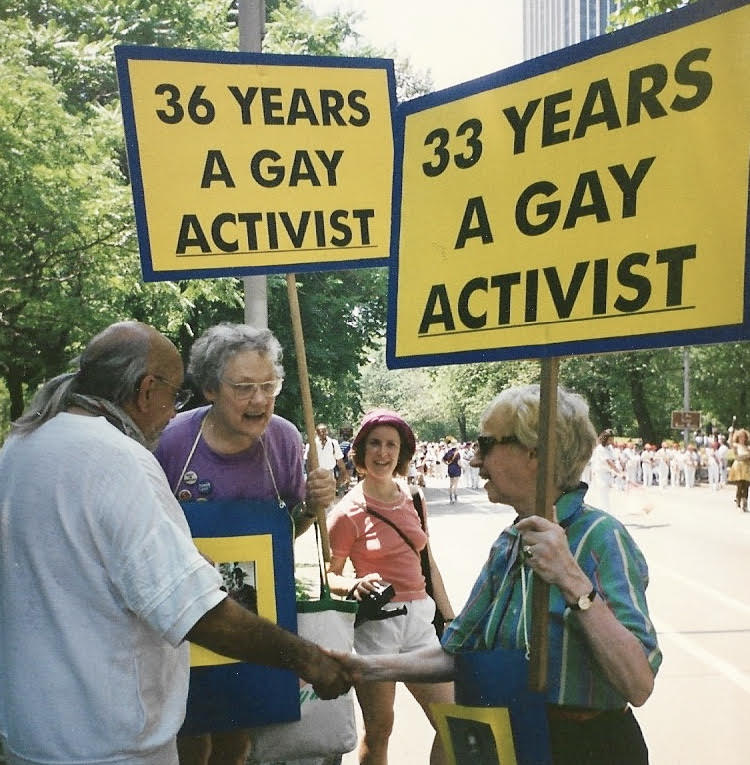
By Mark Segal | PHILADELPHIA, PA – Kay Lahusen, 91, died in gentle hospice care at Chester County Hospital on Wednesday, May 26, 2021, after a brief illness. She was born in Cincinnati in January 1930 and as an infant was adopted and raised by her grandparents. After graduating from Ohio State University, she moved to Boston, where she met her lifelong partner Barbara Gittings at a Daughters of Bilitis picnic in 1961.
Kay and Barbara lived variously in New York, Philadelphia and Wilmington DE. They were gay activists from the early days of the Gay Rights movement in the US, marching openly in picket lines in Washington DC and Philadelphia in the early 1960s. Kay became known as the first openly gay photojournalist. Her photos documenting these and many later activities were printed in various gay publications including Gay (a national weekly) and The Ladder. Her photos are archived in the New York Public Library, which drew upon them for the 2019 book, Love and Resistance; out of the closet into the Stonewall era.
Kay researched and wrote the book Gay Crusaders (1972), which was published under her pseudonym Kay Tobin and with the addition of a male “co-author” (her friend, Randy Wicker) to help with its public acceptance. The original research materials for that book are also archived at the New York Public Library.
Kay and Barbara remained activists throughout their lives. Shortly before Barbara’s death in 2007, they moved to Kendal at Longwood, Kennett Square PA. After Barbara’s death Kay continued to contribute to Gay history, giving many interviews, especially about their work with the American Psychiatric Association and the American Library Association. She collaborated in 2015 with Tracy Baim to produce Barbara Gittings, gay pioneer, a biography of Barbara which used many of Kay’s photos. She decorated her room at Kendal with dozens of photographs, and she would talk about her experiences as a gay activist at the drop of a hat, even regaling the nurses at Chester County Hospital with her story days before her death.
Kay is survived by Trusted Friends: Judith Armstrong of Hockessin DE, John Cunningham of Philadelphia, Ada Bello of Philadelphia, and James Oakes of Secane PA, and by the many, many friends, acquaintances, and admirers — too numerous to name here — who made up her chosen family.
Kay’s remains will rest in the Congressional Cemetery, Washington DC, along with her partner’s in a bench designed to express their love for each other and their dedication to showing that Gay is Good. Due to COVID-19, a public memorial will be postponed. In lieu of flowers, Kay would welcome your contributions to William Way LGBT Community Center, 1315 Spruce St, Philadelphia PA 19107 or to Kennett Area Community Service, P.O.Box 1025, Kennett Square PA 19348 for their local food cupboard.
Condolences may be left at foundsfuneralhome.com.
In December of 2019, the Philadelphia Gay News ran a profile on the 90th birthday celebration of Lahusen. She was asked, So visibility is one of the hallmarks of your life?
In answer she noted; “Oh, absolutely. I enjoyed working on “The Ladder.” I tried to put wonderful women on the covers. That was very important, because before then we only had drawings on covers. We went against the American Psychiatric Association and succeeded in removing homosexuality from the mental illness allegation. I wasn’t at Stonewall, but I certainly admired it. I had a lot to say about it and write about it. I’ve had a terrific life. I think gay couples, getting back to that question, should get involved, and give it all they’ve got. It’s so much fun. Don’t you agree?”
You can read the entire interview here: https://epgn.com/2019/12/27/activist-kay-lahusen-celebrates-90th-birthday/
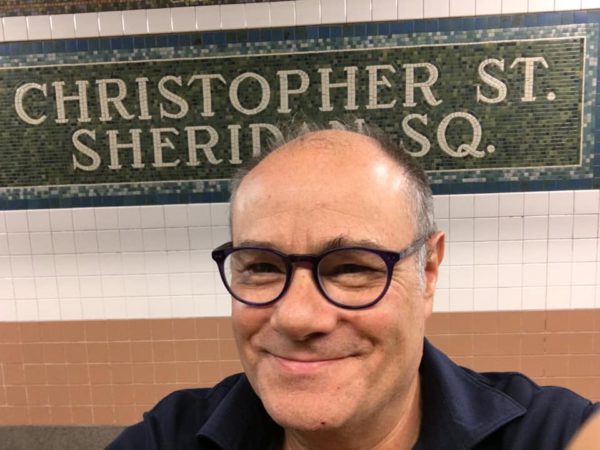
Mark Allan Segal is an American journalist. He participated in the Stonewall riots and was one of the original founders of the Gay Liberation Front where he created its Gay Youth program. He was the founder and former president of the National Gay Newspaper Guild and the founder and publisher of Philadelphia Gay News.
AIDS and HIV
Patrick O’Connell, acclaimed AIDS activist, dies at 67
Played key role in creating red ribbon for awareness
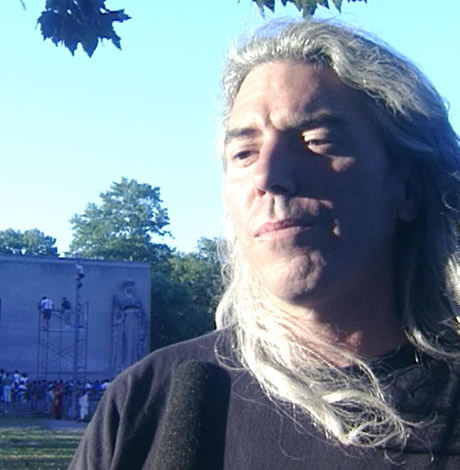
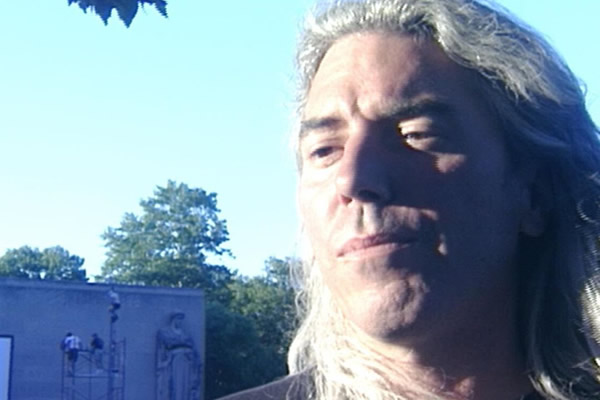
NEW YORK – Patrick O’Connell, a founding director of the New York City-based AIDS advocacy group Visual AIDS who played a lead role in developing the internationally recognized display of an inverted, V-shaped red ribbon as a symbol of AIDS advocacy, died on March 23 at a Manhattan hospital from AIDS-related causes, according to the New York Times. He was 67.
Visual AIDS said in a statement that O’Connell held the title of founding director of the organization from 1980 to 1995.
During those years, according to the statement and others who knew him, O’Connell was involved in the group’s widely recognized and supported efforts to use art and artist’s works to advocate in support of people with HIV/AIDS and efforts to curtail the epidemic that had a devastating impact on the art world.
Thanks to a grant from the Art Matters foundation, Visual AIDS was able to retain O’Connell as its first paid staff member in 1990, the group said in its statement.
“Armed with a fax machine and an early Macintosh computer, Patrick helped Visual AIDS grow from a volunteer group to a sustainable non-profit organization,” the statement says. “A passionate spokesperson for the organization, he helped projects like Day Without Art, Night Without Light, and the Red Ribbon reach thousands of people and organizations across the world,” the group says in its statement.
“We were living in a war zone,” the statement quoted O’Connell as saying in a 2011 interview with the Long Island newspaper Newsday. “But it was like a war that was some kind of deep secret only we knew about,” O’Connell said in the interview. “Thousands were dying of AIDS. We felt we had to respond with a visible expression,” he told the newspaper.
With O’Connell’s help, Visual AIDS in 1989 organized the first annual Day Without Art in which dozens of galleries and museums in New York and other cities covered art works with black cloths to symbolize the mourning of those who died of AIDS. Among those participating were the Brooklyn Museum, the J. Paul Getty Museum in Los Angeles, and the Metropolitan Museum of Art in New York, which replaced a Picasso painting with a “somber informational placard,” according to the New York Times.
In 1990 O’Connell helped Visual AIDS organize the first Night Without Light, which was held at the time of World AIDS Day. New York City’s skyscraper buildings, bridges, monuments, and Broadway theaters turned off their lights for 15 minutes to commemorate people who lost their lives to AIDS, the New York Times reported.
In the kickoff of its Red Ribbon Project in 1991, McConnell helped organize volunteers to join “ribbon bees” in which thousands of the ribbons were cut and folded for distribution around the city, the Times reports. Those who knew McConnell said he also arranged for his team of volunteers to call Broadway theaters and producers of the upcoming Tony Awards television broadcast to have participants and theater goers display the red ribbons on their clothes.
Among those displaying a red ribbon on his label at the Tony Wards broadcast was actor Jeremy Irons, who was one of the hosts. In later years, large numbers of celebrities followed the practice of wearing the red ribbon, and in 1993 the U.S. Postal Service issued a red ribbon stamp.
The Times reports that O’Connell was born and raised in Manhattan, where he attended Fordham Preparatory School and later graduated from Trinity College in Hartford, Conn., in 1973 with a bachelor’s degree in history. According to Visual AIDS, O’Connell served as director of the Hallwalls arts center in Buffalo, N.Y. from 1977 to 1978 before returning to New York City to work for a gallery called Artists Space.
The Times reports that O’Connell learned in the middle 1980s that he had contracted AIDS and began a regimen of early AIDS treatment with a cocktail of over 30 pills a day. His involvement with Visual AIDS, which began in 1989, ended on an active basis in 1995 when his health worsened, the Times reports.
As one of the last remaining survivors of his New York contemporaries who had HIV beginning in the 1980s, O’Connell continued in his strong support for AIDS-related causes through 2000s and beyond, people who knew him said.
Visual AIDS says it is gathering remembrances and photos for a tribute post for O’Connell on its website. It has invited people to share their memories of him by sending written contributions and images via email to: [email protected].
-

 Arts & Entertainment4 days ago
Arts & Entertainment4 days agoA Night of legacy, love, and liberation: Inside the 2025 April Fool’s Ball
-

 Movies4 days ago
Movies4 days agoHeartfelt ‘Wedding Banquet’ remake a romcom worth seeing
-

 Arts & Entertainment5 days ago
Arts & Entertainment5 days agoSouth Coast Repertory Theatre hosting world premiere production
-

 Brazil4 days ago
Brazil4 days agoUS lists transgender Brazilian congresswoman’s gender as ‘male’ on visa
-

 opinions3 days ago
opinions3 days agoOver 36,000 Angelenos unite for ‘Fighting the Oligarchy’ rally
-

 Books2 days ago
Books2 days ago‘Pronoun Trouble’ reminds us that punctuation matters
-

 Congress3 days ago
Congress3 days agoEXCLUSIVE: Garcia demands answers on deportation of gay Venezuelan asylum seeker
-

 Theater3 days ago
Theater3 days ago‘The Broadway Cage Match’ ready to rumble at WeHo’s Musical Mondays
-

 Features3 days ago
Features3 days agoNew mayor Chelsea Byers, hopes to make WeHo a model city for others to follow
-

 Autos13 minutes ago
Autos13 minutes agoSporty sedans: BMW 530i xDrive, Mercedes AMG CLA 3



